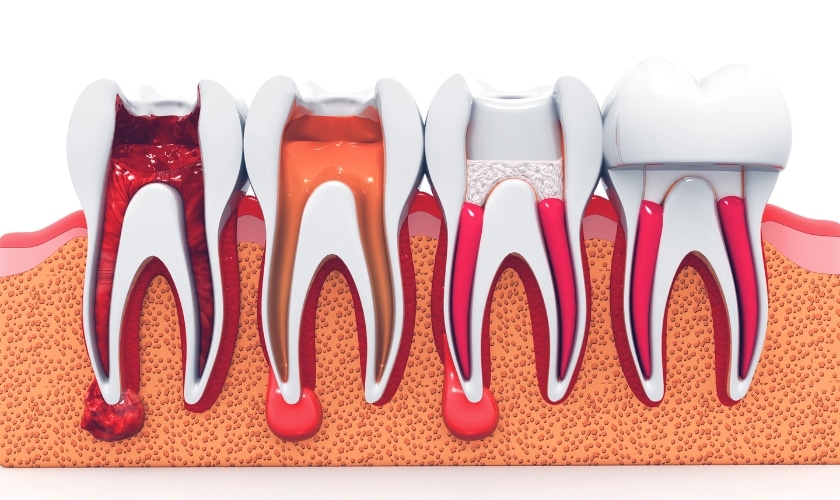Myths and Facts About Root Canal Therapy
By :
Affordable Dentist | November 30, 2023
You've probably heard the whispers and tales about root canal therapy – a dental procedure that sends shivers down many spines. Root Canal Therapy in Fort Worth, TX, has been surrounded by myths, creating misconceptions that might make you hesitate when your dentist recommends it. It's time to separate fact from fiction and gain a clearer understanding of what this procedure entails.
Myth 1: Root Canal Therapy is Excruciatingly Painful
One of the prevailing myths is that undergoing a root canal is akin to enduring unbearable pain. In reality, advancements in dental technology have transformed this procedure into a relatively painless experience. Dentists use local anesthesia to numb the area, ensuring you're comfortable throughout the process. The pain associated with root canals is often a result of the dental infection itself, not the procedure.
Fact 1: Pain Relief is a Priority
Root Canal Therapy aims to relieve pain, not induce it. An infected tooth nerve typically causes the pain you may have experienced before the procedure. The root canal removes the infected tissue, alleviating the pain and preventing further damage.
Myth 2: Root Canal Therapy Causes Illness
A long-standing myth suggests a link between root canal therapy and systemic diseases. Some claim that the procedure can lead to illnesses like heart disease. However, scientific research and extensive studies have debunked this myth, affirming that there is no evidence supporting such connections.
Fact 2: Root Canals are Safe and Effective
Root canal therapy is a safe and effective dental procedure. It focuses on preserving your natural tooth, preventing the need for extraction. By removing the infected pulp, your dentist eliminates the source of the infection, promoting overall oral health.
Myth 3: Extraction is a Better Alternative
Some individuals believe that extracting a tooth is a better and more straightforward solution than undergoing a root canal. However, tooth extraction comes with its own set of challenges. Losing a tooth can lead to issues like misalignment, difficulty chewing, and even bone loss in the jaw.
Fact 3: Preservation of Natural Teeth
Root Canal Therapy prioritizes the preservation of your natural teeth. Unlike extraction, which removes the entire tooth, a root canal removes only the infected pulp while leaving the structure intact. This not only maintains your smile's aesthetic but also ensures optimal oral function.
Myth 4: Root Canals Cause Tooth Discoloration
There's a common misconception that root canal-treated teeth turn dark or yellow over time. In reality, tooth discoloration is often caused by factors like trauma, decay, or medications – not the root canal procedure itself. Modern techniques and materials used in root canals minimize the risk of discoloration.
Fact 4: Improved Aesthetics with Modern Techniques
Advancements in dental materials and technology have significantly reduced the likelihood of tooth discoloration after a root canal. Your dentist will take measures to ensure that your treated tooth matches the color of your natural teeth, maintaining a seamless and aesthetically pleasing smile.
Myth 5: Root Canal Therapy Requires Numerous Appointments
Some individuals believe that root canal therapy is a lengthy process that demands multiple appointments. While the complexity of the case may influence the timeline, many root canals can be completed in just one or two appointments. Technological advancements and the expertise of dental professionals contribute to efficient and streamlined procedures.
Fact 5: Timely and Efficient Procedures
Root canal therapy has become more time-efficient thanks to improved techniques and equipment. Your dentist will assess your specific case and provide a treatment plan that aligns with your needs, ensuring a timely resolution of the dental issue.
Myth 6: Only Severe Pain Indicates the Need for Root Canal
It's a common misconception that root canals are only necessary when severe pain is present. While intense pain is a common symptom, other signs may indicate the need for root canal therapy, such as prolonged sensitivity to hot or cold, swollen gums, or a pimple on the gums.
Fact 6: Early Intervention for Better Outcomes
Early detection of dental issues allows for more conservative treatments. If you experience any signs of potential dental problems, seeking prompt attention from your dentist can often result in less invasive interventions, preventing the need for extensive procedures like root canals.
Myth 7: Root Canals Lead to Weakened Teeth
Some believe that undergoing a root canal weakens the treated tooth, making it more susceptible to fractures. In reality, a tooth that has undergone a root canal is not inherently weaker. However, to ensure its strength and longevity, your dentist may recommend a crown to protect and strengthen the tooth.
Fact 7: Strengthening with Dental Crowns
After a root canal, your dentist may recommend a dental crown to reinforce and protect the treated tooth. Crowns provide an extra layer of strength, ensuring that your tooth functions optimally for years to come.
Some valuable dental procedures aim to preserve your natural teeth, alleviate pain, and maintain your overall oral health. In Root Canal Therapy in Fort Worth, TX, dispelling the myths surrounding this treatment is crucial for making informed decisions about your dental care. Remember, advancements in dental technology have transformed root canals into efficient and virtually painless procedures. If you're facing the prospect of a root canal, rest assured that the reality is far from the myths – it's a step towards preserving your smile and oral well-being.


